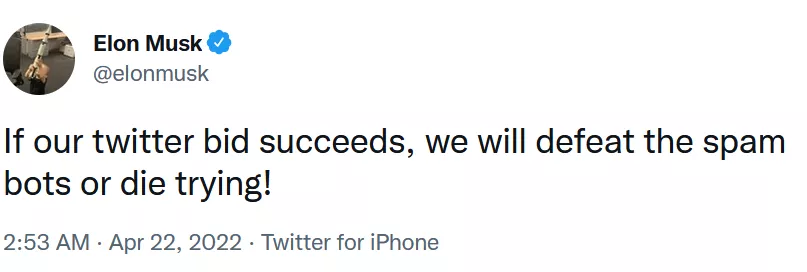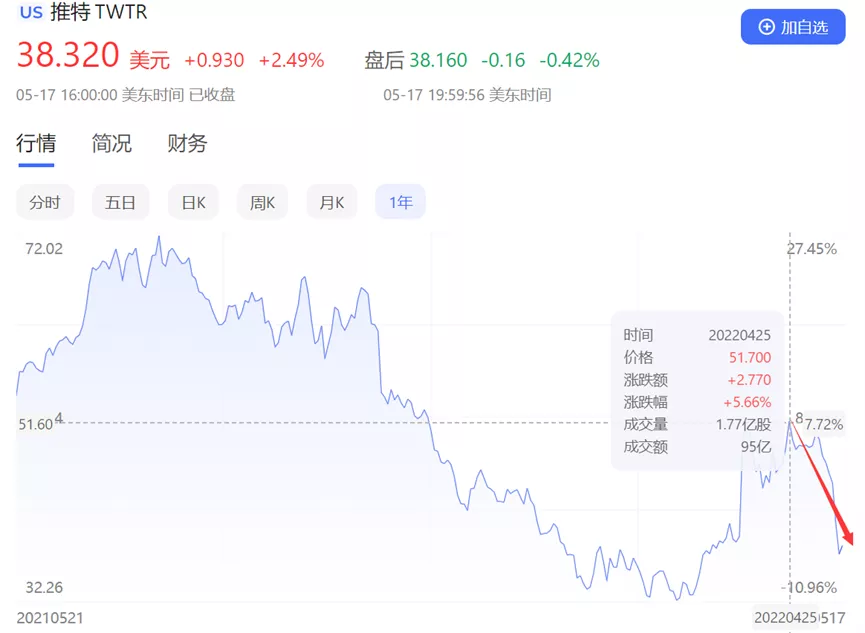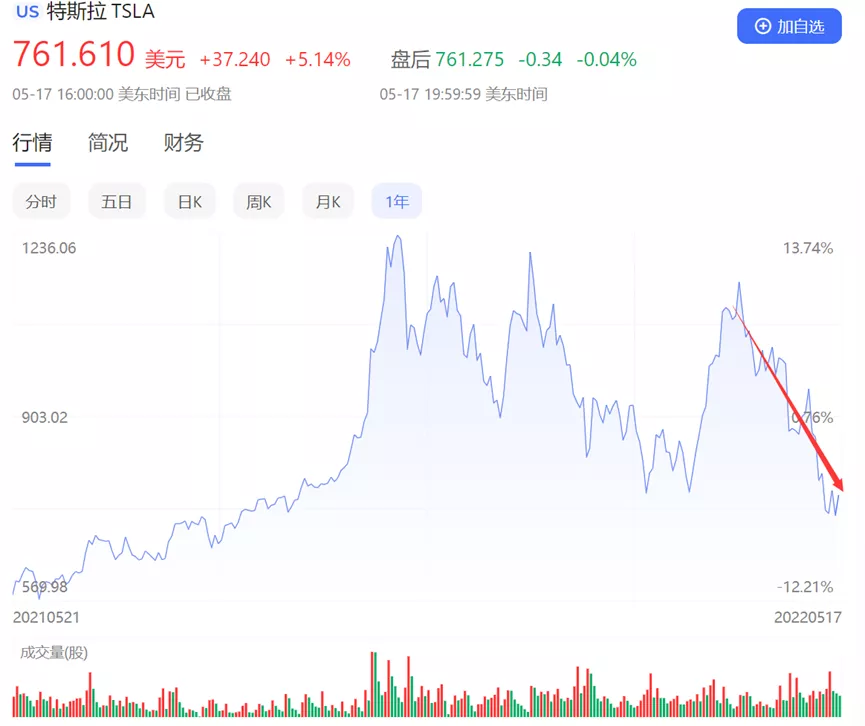The prospect of the acquisition of global social media giant Twitter is beginning to become chaotic. According to previous articles on Wall Street, Tesla CEO musk said that unless twitter proves that the false account is less than 5%, the transaction cannot be promoted. Before announcing the acquisition of twitter, musk didn't know anything about Twitter's false account. Why did he make a big fuss about it halfway through the acquisition?
In addition, in the context of the recent sharp decline in technology stocks, the shares of Twitter and Tesla fell sharply, making the transaction look more and more "expensive"; Plus the financing will make twitter debt ridden, even if the acquisition is successful, musk still faces great pressure. Stopping trading at this point in time inevitably raises doubts about his real motives.
Musk doesn't mean "false account"
According to a joint press release of Twitter and musk previously disclosed by the SEC, he promised to "make twitter better" by "Combating spam robots".

Musk once tweeted: "if we succeed in acquiring twitter, we will either defeat the spam robot or die in our efforts!"

However, according to the joint press release, in the past less than a month, musk attacked twitter through the proliferation of false accounts, saying that the transaction could not be promoted unless twitter proved that the false accounts were less than 5%. Musk believes that the number of false users of twitter may account for 20%, four times that of "only 5%" previously claimed by twitter.
False accounts do bring some risks to twitter.
As Bloomberg pointed out, false accounts have potential network security risks. As a social media, Twitter is not as mature as Google and Microsoft in terms of network security. False accounts frequently publish annoying spam, which will reduce the user experience of real users. For twitter, cracking down on fake accounts may damage the total number of Twitter users.
Twitter has said in its quarterly results that the average number of false or spam accounts "is less than 5% of monthly and daily active users in this quarter", which is basically consistent with its evaluation results in the past eight years.
Parag Agrawal, CEO of twitter, outlined his estimation method of the figure of 5% on Twitter and believed that the third party could not accurately determine the figure without obtaining data such as IP address, geographical location and telephone number.
Then musk replied with a poop emoticon.
If musk is so concerned about the number of fake users, why didn't he investigate before he bought twitter? And question almost everything before it's settled?
As Matt Levine, an investment banker at Goldman Sachs and a columnist for Bloomberg's financial review, pointedly pointed out, the false account was not the reason why he withdrew from the transaction. If he doesn't want to buy twitter because he has a false account, he shouldn't sign a contract to buy twitter.
"Musk knew about these assessments before announcing his acquisition of twitter, but did not conduct any private due diligence.
He did not show any evidence that Twitter's estimates were wrong, and of course there was no evidence that they were materially wrong or out of malice.
Obviously, Agrawal's thoughtful answer is basically correct. “
An increasingly uneconomic deal
So, in the weeks after announcing the $54.2 acquisition of twitter, what made musk change his mind?
The first is the subject matter of this transaction - twitter. Since musk made a takeover offer on April 13, Twitter's share price has fallen 25.9% from a high of $51.7. As of the close of U.S. stocks overnight, twitter shares were at $38.32, 29% lower than the price of $54.20 a share musk agreed to pay.

Secondly, the recent decline in Tesla shares has also reduced Musk's wealth. Since April, Tesla's stock has fallen nearly 30%, and Tesla's market value has evaporated more than $300 billion.

In the context of the Fed's aggressive "water collection", technology stocks that are heavily dependent on future cash flow are under great pressure.
Now, the price of $54.20 per share looks very uneconomical. Therefore, it's best for musk to reprice, but according to the acquisition agreement he signed, he can't quit just because the stock fell.
So musk needs an excuse. As Levine said:
"So he pretended that he wanted to reprice for other reasons. He didn't pretend very hard - a poopy expression is untenable in court!
But he did enough to confuse the public and give his fans an excuse to believe that he was really a victim. "
Trapped in debt quagmire, Twitter has great pressure on transformation
In addition, compared with the huge debt brought by Musk's acquisition, it is a real headache.
According to Bloomberg, the financing plan was hastily formulated and signed by the bank before April 20. Part of the funds for the acquisition come from leveraged loans and high-yield bonds, which will also lead twitter into a deeper debt quagmire.
CreditSights estimates that Twitter's annual interest expense has soared to about $900 million, while Bloomberg expects that figure to reach $750 million to $1 billion.
Such huge data means that Twitter's amazing money burning speed in the future will undoubtedly put pressure on musk, who previously formulated a "grand blueprint" for twitter. Even if musk doesn't get into debt, there will be little room for him to make mistakes.
As Bloomberg said, it is not surprising for sober credit analysts to think twice about such a deal.
Inexplicable connection between false account and stock price
Finally, does musk really hate "false accounts"?
According to the Los Angeles Times last month, a preliminary study by David A. Kirsch, a professor at the Robert Smith School of business at the University of Maryland, showed that false accounts played an important role in the fluctuation of Tesla's share price.
Kirsch and his assistant Moshen Chowdhury collected tweets about Tesla from 2021 to the end of 2020. They found that a fifth of Tesla related tweets were generated by robots.
Kirsch and Chowdhury tracked 186 Tesla related robot accounts and found that Tesla's share price rose by more than 2% after each account went online.
When Tesla's "model s" account was launched in November 2013, Tesla's "model s" account was quickly negative. Over the next seven years, more than 30000 such tweets were posted.
Kirsch said that any direct link between the tweets posted by the robot and the stock price had not been determined, "but it did raise questions."